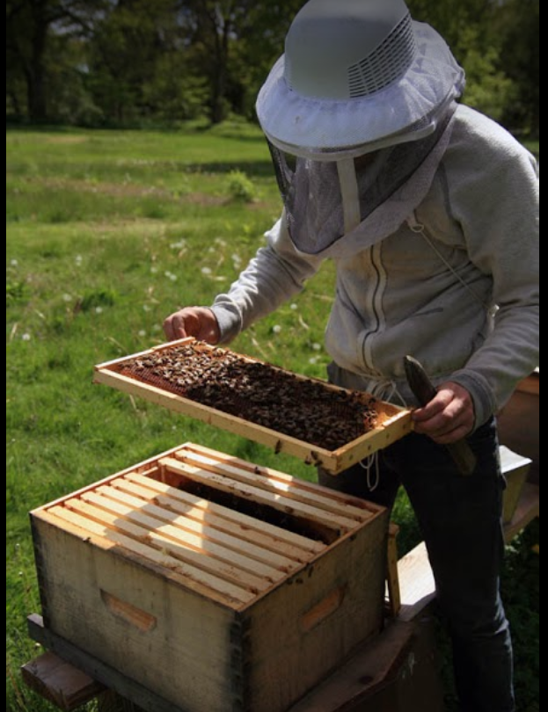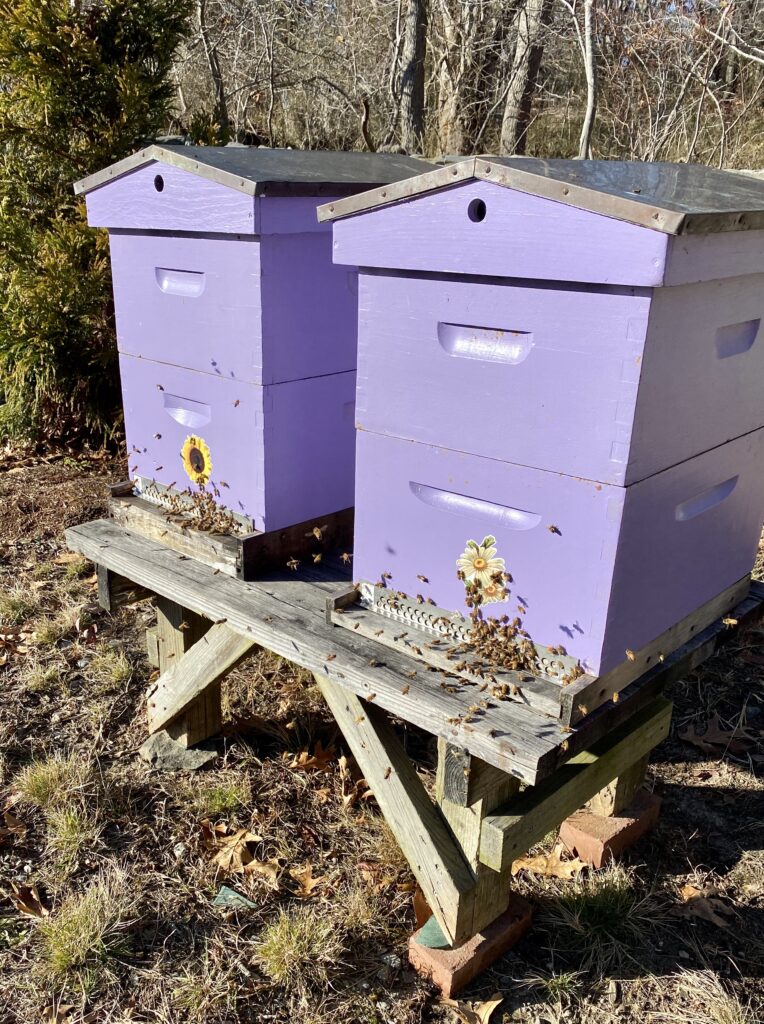In 2015, Kevin Kennedy of West Warwick had bees on the brain. Introduced to the practice of beekeeping by his son, who was managing some hives, Kennedy found a new calling. He dove into the mass of available literature and built beekeeping from a hobby to a full honey farm called K Dog’s Apiary Services.

In addition to enrolling in classes offered by the Rhode Island Beekeepers Association (RIBA), “I read a bunch of books,” he said. “I was fascinated by the bees and how they worked together to keep the colony alive and flourishing. Before I started with my first two colonies, I took the time to educate myself about the process.”
The practice of beekeeping has flourished over the past decade, now accounting for 2.6 million managed colonies across the country. And although the managers of many small-scale operations may be viewed as hobbyists with a particular love for pollinating insects, the practice is anything but amateur. Members of the beekeeping culture stress that while the activity is exponentially rewarding, it takes significant investments in time and practice to get it right.
Spring is the most important time of the year for beekeepers, said Kennedy, when preparations are made that will affect the colonies through the rest of the year. “Caring for a colony of one queen and up to 60,000 workers requires a lot of [effort], attention to detail and planning.”
RIBA president and master beekeeper, Scott Langlais, said the Rhode Island scene is not made up of large-scale, migratory operations like those found in the Midwest. “We are ‘backyard beekeepers’ by and large, whether our hives are on a family farm, a community garden or an urban rooftop,” he said.
Between start-up equipment and protective gear, Langlais said the costs of establishing a single colony will run around $500.

“Beekeeping in 2021 is challenging. Education is essential and we stress in our beginner’s bee school that education is ongoing. You can’t learn everything you need to know in a single class, or single year,” he said. “To be successful you really need a good basic introductory class and then the support of the local beekeeping community.”
One doesn’t necessarily need a private farm or open field to take up the practice, said Langlais.
“Beekeeping can be practiced safely even in an urban setting, but there are considerations to take. It is extremely important for beekeepers to be aware of their neighbors,” he added. “It’s wonderful that honey bees enjoy such popularity these days, but there are still misunderstandings that can arise. A conscientious beekeeper should be able to allay these fears and minimize disagreements.”
The environmental dividends are numerous. While the honey is sweet, the pollination needed in surrounding agriculture is sweeter. Scientists estimate about one-third of the food on the average American plate requires insect pollination to produce. According to the Food and Drug Administration, honey bees alone pollinate $15 billion worth of crops annually. Despite their benefits, would-be keepers should double-check with neighbors before populating their backyards with humming hives. In Rhode Island, every beekeeping operation, whether commercial or private, is required to register with the Department of Environmental Management.
Calvin Alexander was born in Trinidad and Tobago and was always interested in agriculture. While studying at the Caribbean Institute of Agriculture and Forestry, he witnessed a swarm of bees being captured from an avocado tree during a summer training program. He was instantly hooked, took up the study of beekeeping and later moved to Warwick, where he now chairs the RIBA Presentation Committee. He manages bee colonies in his own backyard and has others in Portsmouth and Ashaway Village.
Lately, Alexander has been studying how the different seasons and species of flowers contribute to the taste of honey (spring equals light and floral; autumn brings a dark robustness). “Beekeeping has kept me occupied and has been my escape from the pandemic and the host of social issues that came to a head during the past year,” he said. “I get to observe their social structure in real time. As a beekeeper you learn honey bee biology and behavior. There is never a dull moment. Of course, there are times when the bees don’t follow the script, but they’re extremely intelligent and adaptable insects.”
Kennedy is in it for the long haul. As a member of RIBA, he now coordinates the annual “Field Day,” where newbies can take educational seminars.
“One of the best rewards I get from being a beekeeper is that I get to help my communities’ environment by helping pollinate the surrounding area,” he said. “Keeping bees provides a unique glimpse into the interconnectedness of the natural world. The interplay of rain, sun, soil and bees as the seasons unfold is absolutely fascinating to watch. It makes you more aware of your place in the environment as a whole and deepens your respect for the natural world.”
Kennedy agreed there is much we can learn from observing the colonies. Indeed, even the comradery among beekeepers serves as a microcosmic metaphor. “The community is like a colony of bees, everyone helping each other work toward a common goal.”

Providence College professor of biology Dr. Racheal Bonoan is an expert in pollination who has studied various social insects, such as honey bees and bumble bees. Referred to as “eusocial,” these species fascinated Bonoan, with their cooperative division of labor and instinctual behaviors that worked to keep the colony alive. “I often tell people that honey bees chose me,” she said. “As social organisms ourselves, we can learn quite a lot from the inner workings of a honey bee colony. Honey bees work together to protect the hive from pathogens, even if it means working harder than usual.”
Bonoan implored people interested in landlording over a beehive (or a collection of them) to do their research.
“It’s important that new beekeepers know what they’re signing up for,” she said, adding that anyone unwilling to make the wholesale commitment can still play a part by planting flowers and allowing bee-friendly weeds such as dandelions to grow.
“Without bees and other insect pollinators, we’d be hard-pressed to get a healthy diet ourselves. Insect pollinators visit flowers to collect food. In the process of collecting food, pollinators carry pollen between flowers, fertilizing the flowers and allowing them to develop into many of the fruits, nuts and veggies we love,” said Bonoan. “The healthier we keep our bees, the healthier our diet and the ecosystem will be.”
Last year, Alexander turned his hobby into a business, officially registering the Bailey Beattie Apiaries, named after his late mother and mother-in-law, both of whom succumbed to cancer. He now harvests honeycomb and beeswax in addition to honey.
“Honey is the third most faked food in the world, so there’s a strong chance that store-bought honey might have some form of adulteration,” he said. “By supporting your local beekeeper, you are not only assured of the quality of what you’re consuming, you’re also supporting your local economy and helping your environment.”


